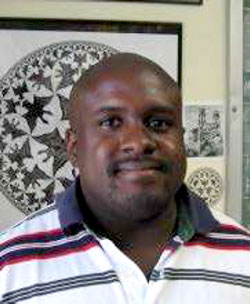|  Quincy
Loney, Ph.D. Quincy
Loney, Ph.D.
Region: Northern
Program Institution: SUNY Potsdam
Education
College/University: SUNY Potsdam
Major/Minor: B.A. Mathematics
Graduation Date: 2001
Graduate School/University: SUNY Potsdam
& Binghamton University
Graduation Date: 2003 & 2012
Advanced Degrees/Professional Licenses:
M.A. & Ph.D. Mathematics
Significant Professional or Academic Accomplishments:
Quincy graduated from SUNY Potsdam in May 2001 with a B.A.
and again in 2003 with an M.A. both in Mathematics. During
his undergraduate work, he participated in the Potsdam-Clarkson
Research Experience for
Undergraduates during the summer in 2000 and 2002; his group
worked on graphs with disjoint links in every spatial embedding.
He was also a tutor for the Math Lab and Student Support Services.
He received a Clark Fellowship which funded most of his
graduate studies at Binghamton
University and he also received an AGEP/NSF Co-Teaching/Co-Mentoring
fellowship. In 2008, Dr. Loney co-founded an annual NSF funded
conference, the Binghamton University Graduate Conference
in Algebra and Topology (BUGCAT). Dr. Loney’s doctoral
studies focused on vertex operator algebras, a type of mathematics
that has applications for string theory, which is an area
of theoretical physics. He completed his doctoral work in
2012, specializing in Lie algebras and representation theory.
In Fall 2012, he returned to SUNY Potsdam to give a presentation
to CSTEP students and math majors entitled The Octonions:
An Alternative Algebra to the Reals.
He is a member of the American Mathematical Society, Mathematical
Association of America and Pi Mu Epsilon. Throughout his career,
Dr. Loney has taught a number of mathematics courses at the
college level, such as Calculus I, II and III. His research
interests are: finite dimensional semisimple Lie algebras,
affine Kac-Moody Lie algebras, representation theory, vertex
operator algebras and non-associative algebras.
Dr. Quincy Loney about the CSTEP program: “The CSTEP
program at SUNY Potsdam was the main catalyst for my academic
success. It was there that I found out about graduate school
and the limitless career possibilities that holding an advanced
degree would provide. CSTEP helped to instill in me a love
for learning. As a group we pushed each other to be better
students, and years later I still have an unquenchable thirst
for knowledge.”
|

